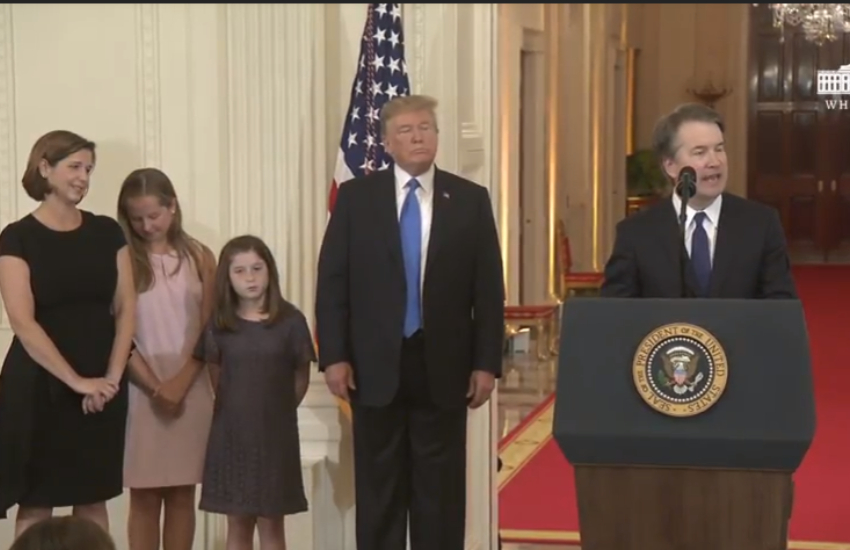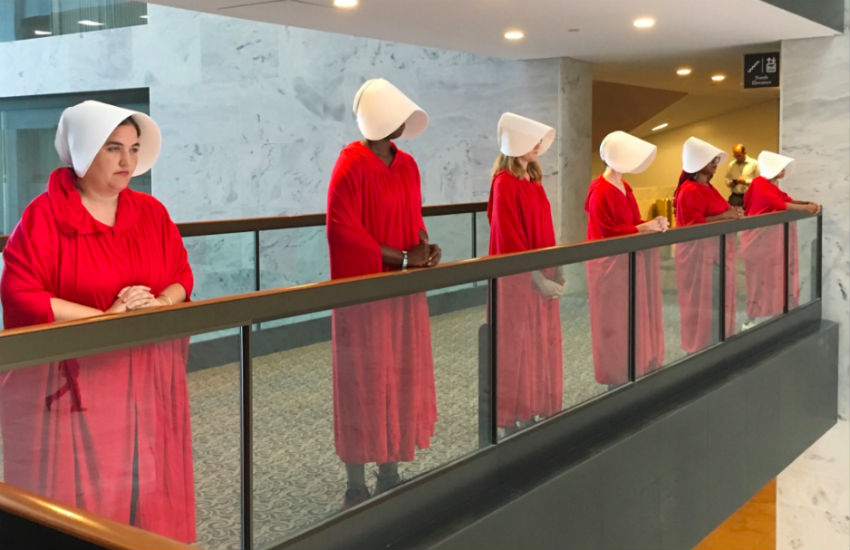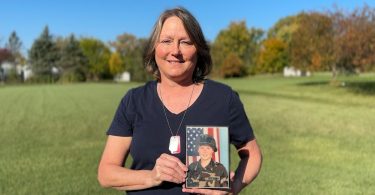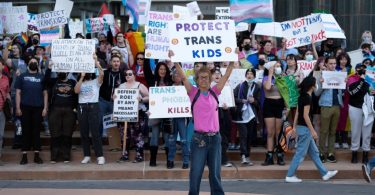Protest at Brett Kavanaugh confirmation hearing. | Photo: Laura Litvan / Twitter
Protestors gathered at the Hart Senate Office Building in Washington today (4 September) for the Supreme Court confirmation hearing of Brett Kavanaugh.
When Justice Anthony Kennedy announced his retirement in June, President Donal Trump nominated Kavanaugh to replace him.
There is one chief justice and eight associate justices. But currently, there are four Democrat-leaning justices and four Republican-leaning justices.
Trump’s pick of Kavanaugh would give the Republicans an edge in the highest court of the United States.
While Kavanaugh does not have a clear cut position on LGBTI issues, LGBTI and women’s advocacy groups united to condemn him.
He is also very vocal about his pro-gun beliefs.
Even more contentiously, he’s likely to overturn the historic Roe v Wade decision. Roe vs Wade led to abortion becoming legal in the US, so this would essentially recriminalize abortion.
In the corridor outside the Brett Kavanaugh confirmation hearings, “The Handmaid’s Tale” pic.twitter.com/13qhg5rYDu
— Laura Litvan (@LauraLitvan) September 4, 2018
In a previous case with an undocumented worker in the US seeking an abortion, Kavanaugh said in his ruling: ‘The Government has permissible interests in favoring fetal life, protecting the best interests of a minor, and refraining from facilitating abortion.’
The women protesting today wearing the Handmaid’s Tale robes stood silently on the building’s walkway.
They’re signaling a stripping back of women’s rights if Brett Kavanaugh is confirmed.
Donald Trump previously said he’d only nominate candidates for the Supreme Court who would overturn Roe v Wade and Obamacare.
What’s new from the hearing today?
During any Supreme Court confirmation hearing, the candidate must face a series of hearings in which both the nominee and other witnesses make statements and answer questions.
Confirmation by the Senate allows the President to formally appoint the candidate to the court.
But during the proceedings today, a few things didn’t quite go according to plan.
According to a spokeswoman for the Capitol Police, they arrested 22 protestors (so far) and charged them with disorderly conduct.
The Women’s March Twitter page stated police also arrested more than 30 women.
Police also removed a handful from the court for interrupting the proceedings.
During Chairman Chuck Grassley’s speech, Democrats also began demanding a delay in the proceedings. This is because they want more documents to be released about Brett Kavanaugh’s background.

Brett Kavanaugh is Donald Trump’s nominee for the Supreme Court. | Photo: YouTube/White House
But Grassley said that last night (3 September), 42,000 pages of documents were released. Democrats say there are even more documents still missing, before they have Kavanaugh’s entire political background.
Sen. Dianne Feinstein then raised several protections and rights that she worried Kavanaugh would roll back.
She said: ‘You’re being nominated for a pivotal seat. It would likely be the deciding vote on fundamental issues,’ according to the Guardian.
‘Behind the noise is really a very sincere believe that it is so important to preserve a multi-ethnic, multi-religious, multi-economic a court that really serves the people and really serves this great democracy. That’s my worry,’ she said.
Senator Patrick Leahy labeled the hearing ‘not only shameful, it’s a sham’.
He said in his 44-year public service, it’s the ‘most incomplete, most partisan, least transport vetting for any Supreme Court nominee that I’ve ever seen and I’ve seen more of those than anyone serving in the senate today.’
What’s at stake?
The Human Rights Campaign’s Chad Griffin said earlier this year: ‘In nominating Brett Kavanaugh, Donald Trump has followed through on his threat to nominate a justice who would undermine LGBTQ equality, women’s reproductive rights and affordable healthcare.’
HRC said the next Supreme Court justice will shape civil and constitutional rights jurisprudence in the country for decades to come.
In the coming years, the Supreme Court will have to decide critical issues for the LGBTI community including:
- The US’ nondiscrimination laws including protections for LGBTI people — as many lower courts have already concluded. This would impact employment, housing, healthcare and education civil rights statutes.
- Individuals and organizations having a license to discriminate against LGBTI people when receiving taxpayer dollars to provide critical services.
- LGBTI people and families turned away from businesses open to the general public.
- Qualified transgender people excluded from serving in the military, simply because of who they are.







